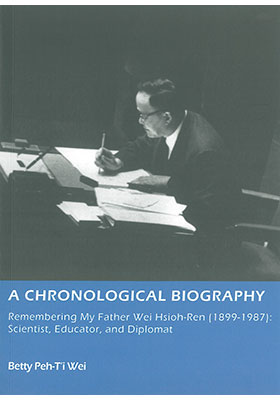A Chronological Biography
Remembering My Father Wei Hsioh-Ren (1899–1987)
(年譜:我的父親魏學仁(1899–1987):科學家、教育家和外交官)
ISBN : 978-988-77020-4-7
Distributed for HKU Jao Tsung-I Petite École 香港大學饒宗頤學術館
August 2016
356 pages, 5.875″ x 8.25″, color and b&w illus.
- HK$250.00
A recounting of the life and work of Wei Hsioh-Ren (1899–1987), nuclear physicist (PhD 1928, University of Chicago); educator (Founding Dean of the College of Science, University of Nanking 1930–1945 and Distinguished Professor of Physics and Public Affairs 1962–1972); and Diplomat (Advisor, Chinese Permanent Delegation to the United Nations 1946–1962, assignments included Chief Chinese Representative to the first international meeting of peaceful uses of atomic energy 1955 and signing the UN General Assembly statute creating the International Atomic Energy Agency 1956).
Using the style of traditional Chinese chronological biography (年譜), the author records major events of her father’s life in the context of what was taking place in China and the world. The text is supplemented with photographs from family collections.
“The late Qing and Republic era marked the transition between traditional and modern China. More than a few of the men and women of that generation, educated in schools and universities in China with post-graduate studies overseas, made valuable contributions to the modernization of their own special areas. Dr. Wei Hsioh-Ren, scientist, educator, and diplomat, was among them. The Jao Tsung-I Petit Ecole is noted for research and publications on the Qing and Republic periods. We are particularly interested in strengthening individual biographies of the era. Hence, we welcome the publication of the life and work of this distinguished scientist, educator and diplomat.” —Dr. Peter Wai-ming Cheng, Jao Tsung-I Petite Ecole, University of Hong Kong
“This book movingly gives an account of the life and work of Dr. Wei Hsioh-Ren, a great humanist and scientist who achieved one of China’s earliest doctorates in nuclear physics, was founding dean of the College of Science at the University of Nanking (金陵大學), introduced audio-visual to science classrooms, and made documentary films to bring general knowledge to the illiterate public. A documentary made under his leadership won China’s first film prize in 1935. In 1936 Dr. Wei personally took the world’s first motion picture of a total solar eclipse in colour. After World Wari II, as scientific adviser to the Chinese delegation to the United Nations (1945–1962), was part of an international team of scientists who worked with the Atomic Energy Commission and the Security Council. He was China’s Chief Representative to the First International Meeting of Peaceful uses of Atomic Energy, and signed for China the United Nations General Assembly resolution creating the International Atomic Energy Agency (IAEA).” —Professor Emeritus Beatrice S. Bartlett, Yale University

